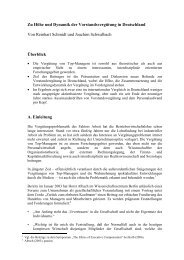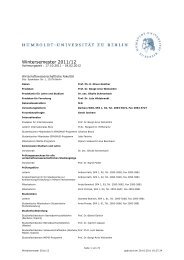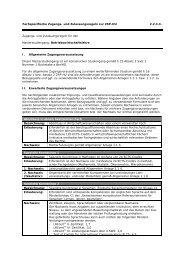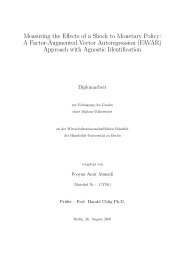Kommentiertes Vorlesungsverzeichnis WS 2012/13
Kommentiertes Vorlesungsverzeichnis WS 2012/13
Kommentiertes Vorlesungsverzeichnis WS 2012/13
Erfolgreiche ePaper selbst erstellen
Machen Sie aus Ihren PDF Publikationen ein blätterbares Flipbook mit unserer einzigartigen Google optimierten e-Paper Software.
Diplom: 2 KP, ABWL<br />
Prüfung:<br />
Klausur (60 min)<br />
70 606 Introduction to Financial Accounting (ehem. Advanced Accounting and<br />
Financial Statement Analysis) (englisch)<br />
2 S<strong>WS</strong><br />
VL/UE Mi 08:30-10:00 wöch. SPA 1, 202 U. Brüggemann<br />
The goal of the course is to present students the basics of financial accounting. The course comprises three main parts. The first<br />
part deals with the objectives of financial accounting and the question why and how financial accounting is regulated. The second<br />
part provides an introduction to group accounting including details on consolidation methods and cash flow statements. The third<br />
part focuses on specific accounting rules under International Financial Reporting Standards (IFRS).<br />
• Objectives of financial accounting<br />
• Regulation of financial accounting<br />
• International financial accounting differences and harmonization<br />
• IFRS: institutional background and framework<br />
• Fundamentals of group accounting<br />
• Consolidation methods<br />
• Cash flow statements<br />
• Deferred taxes<br />
• Accounting for tangible assets<br />
• Accounting for intangible assets<br />
• Accounting for financial instruments<br />
• Hedge accounting<br />
• Accounting for inventories, constructions contracts and revenues<br />
• Pension accounting<br />
Literatur:<br />
Alexander, David and Christopher Nobes (2010): Financial Accounting – An International Introduction, Prentice Hall.<br />
Harrison, Walter, Charles T. Horngren, Bill Thomas, and Themin Suwardy (2010): Financial Accounting (IFRS), Prentice Hall.<br />
Relevant chapters and additional material will be announced throughout the course.<br />
Organisatorisches:<br />
MA: 3 SP, Modul: "General Management" oder"Accounting Courses"<br />
Diplom: 2 KP, ABWL<br />
Prüfung:<br />
Klausur (60 min)<br />
70 606 Introduction to Financial Accounting (ehem. Advanced Accounting and<br />
Financial Statement Analysis) (englisch)<br />
1 S<strong>WS</strong><br />
TU Do 10-12 14tgl./2 SPA 1, 220 N.N.<br />
70 610 Strategic Management (englisch)<br />
4 S<strong>WS</strong><br />
VL/UE Do 16-20 wöch. SPA 1, 202 O. Cobanli,<br />
F. Hubert<br />
We analyze the behavior of firms when there is strategic interaction with competitors, suppliers, and customers. This is typically<br />
the case, when competition is not perfect. In this sense, the course is similar to a course in Industrial Organization (IO). There<br />
are two main differences. First, we will pay little attention to economic policy (regulation and competition policy). Second, we<br />
discuss tools which should guide the analysis in practical situations.<br />
There will be lectures (in English) and you are expected to spend roughly the same amount of time on home assignments. You<br />
should work out the exercises in small teams (3 students).<br />
Basic knowledge of microeconomic theory and game theory is useful but not strictly required. It will be explained as we need it.<br />
Organisatorisches:<br />
MA: 6 SP, Modul: "General Management"<br />
Prüfung:<br />
Klausur (90 min)<br />
70 6<strong>13</strong> Economics of Entrepreneurship (englisch)<br />
2 S<strong>WS</strong><br />
VL Mi 10-12 wöch. SPA 1, 202 C. Schade<br />
In this lecture we offer a theoretical background to macroeconomic, psychological and microeconomic aspects of entrepreneurship.<br />
Among macroeconomic aspects we present the role of the entrepreneur in the national economy, economic growth and the<br />
value of entrepreneurship. Psychological aspects include the personality of the entrepreneur and a typology of entrepreneurs.<br />
Microeconomic aspects treat problems at firm level such as incentives in entrepreneurial teams and financing problems.<br />
Organisatorisches:<br />
MA: 3 SP, Modul: "General Management"<br />
Seite 49 von 82<br />
Wintersemester <strong>2012</strong>/<strong>13</strong> gedruckt am 16.11.<strong>2012</strong> 08:15:03


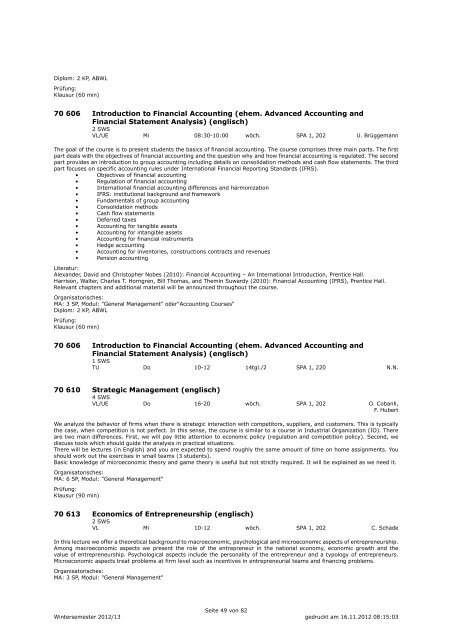

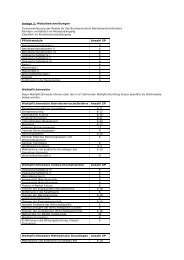


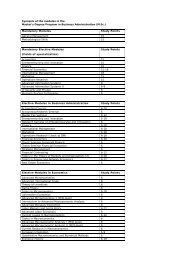

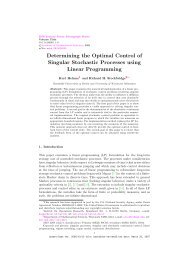


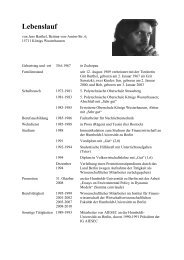
![[Text eingeben] [Text eingeben] Lebenslauf Anna-Maria Schneider](https://img.yumpu.com/16300391/1/184x260/text-eingeben-text-eingeben-lebenslauf-anna-maria-schneider.jpg?quality=85)
